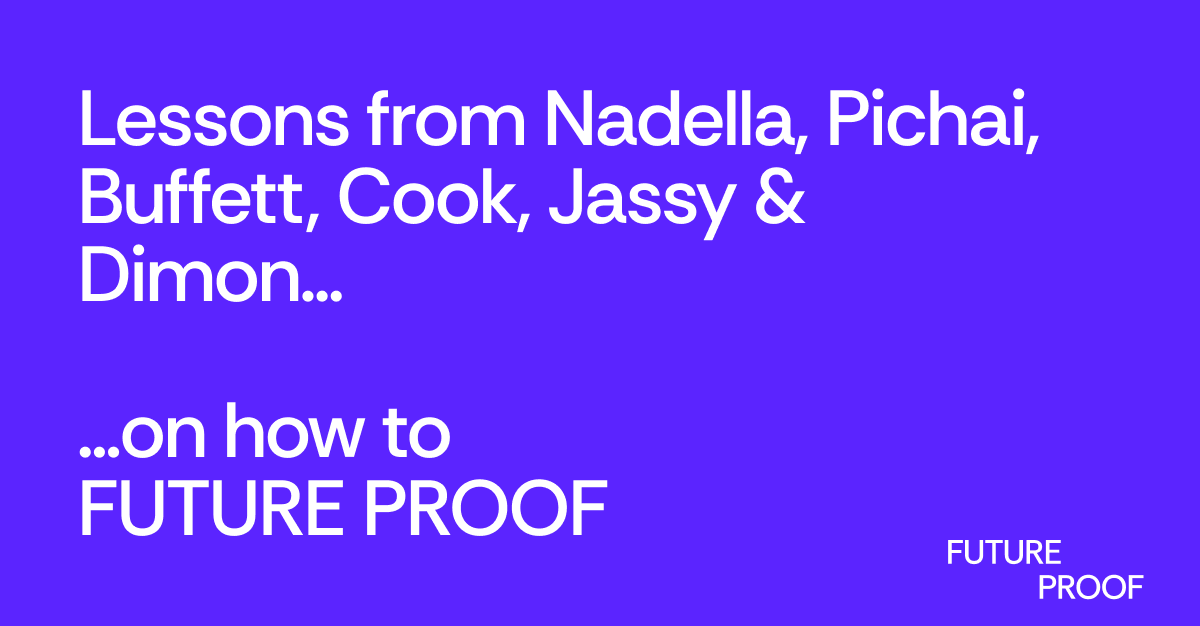
Hi there,
It’s a question that seems to be on everyone's mind right now: In a world of constant change, what does it actually take to build a secure and successful career?
The typical advice to "be a lifelong learner" feels a little vague. So I decided to go straight to the source. I looked at the most recent advice from the leaders of the world's most influential companies—not as gospel, but as a window into the future of work.
What I found was a fascinating and refreshed playbook for career resilience, built on three core pillars.
Pillar 1: Be the Director, Not Just the Actor
The consensus on AI has evolved. It’s no longer enough to just use the tools; the real value is in directing them with expertise and a clear vision.
Satya Nadella, CEO of Microsoft: Nadella recently emphasized that even as AI gets better at writing code, your most critical skill is your ability to think logically and see the bigger picture. He advises focusing on "computational thinking" because it allows you to become the "software architect" who designs the system. In his view, "AI accelerates your path to becoming an architect. It doesn't replace the need for one. You are the one with the taste, the judgment, and the standards."
Sundar Pichai, CEO of Google: Pichai frames AI not as a simple tool, but as an "extraordinary companion." He believes that as AI handles more routine analysis, our unique value will come from our creativity. His advice is to "treat AI as a creative partner. Use it to brainstorm, to explore novel ideas, and to push the boundaries of what you think is possible. The most important human skills will be the ones that amplify this partnership—curiosity, empathy, and creative problem-solving."
Pillar 2: Your Network is Your North Star
As the world gets more digital, the leaders I studied are doubling down on something surprisingly analog: the profound impact of people.
Warren Buffett, CEO of Berkshire Hathaway: At the 2025 Berkshire Hathaway annual meeting, Buffett’s core advice for young people wasn’t about stocks, but about life. He said, "You want to associate with people who are the kind of person you’d like to be. You'll move in that direction. And the most important person in that respect is your spouse. It's also important in business. If you hang around with people who are better than you are, you're going to have a better life."
Tim Cook, CEO of Apple: Cook has long believed that true innovation happens at the "intersection of technology and the liberal arts." He argues that the goal of learning a technical skill isn’t just about the skill itself. "Learning to code is important," he has said, "but more important than the coding is the problem-solving and critical thinking you learn. It's about finding a new language to express yourself and your creativity in a world that is being transformed by technology."
Pillar 3: Adopt the Startup Mindset
In a complex world, the most effective leaders are pushing for a return to simplicity, speed, and focus.
Andy Jassy, CEO of Amazon: In his latest letter to shareholders, Jassy’s focus was on reviving Amazon's "Day 1" startup culture. He urged his teams to "increase the speed of implementation and decision-making." His practical advice is to empower teams to be "owners, not just employees," who feel a deep responsibility to cut through bureaucracy and resist the pull towards perfectionism when speed is what truly matters for the customer.
Jamie Dimon, CEO of JPMorgan Chase: In his annual letter, Dimon offered a masterclass in respecting people's time. He is ruthless about focus. "We have a discipline about meetings," he wrote. "They must have a clear purpose, we use simple language, and there is always a follow-up list of action items. We must respect our employees' time. Kill unnecessary meetings. If a meeting must happen, demand total focus from everyone in the room."
So, what's the common thread? A future-proof career isn't about one skill. It's about building a personal toolkit that combines your unique human judgment with the power of technology, is amplified by the people you surround yourself with, and is sharpened by a relentless focus on speed and impact.
What's the best piece of career advice you've received lately? I'd love to hear it. Just hit reply and let me know.
Until next week,
Alex